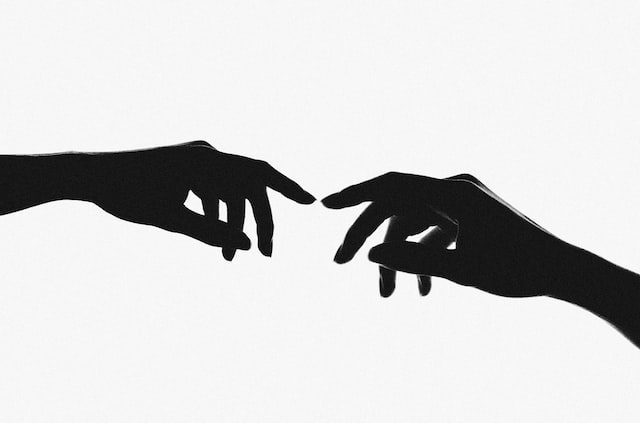
For a brief moment, I thought I was free from insecurity. For a brief time, I believed that I didn’t have any self-worth challenges to overcome. I believed I was confident, courageous, and conscious. And within just a few seconds of my husband telling me he spoke to a woman on the phone, everything I thought I knew about myself was pulled out and I lost it in the air.
I remember a time in our relationship where my husband wore his insecurity on his sleeve. He always believed I was cheating on him, hiding things from him, and lying to him. For the most part, at the time he was accusing me, I wasn’t. But after so much accusation, I was already guilty in his eyes and so I did start doing the things he was accusing me of.
I did cheat on him. Twice before we were married, and once within the first year of marriage. Each event occurred during a military obligation. He would leave me for the military, and I would replace him with a body. All instances were only temporary. I never had any intention of pursuing a relationship with other men. It was only to get sex when I was left to go without due to my husband’s absence.
Men were mere objects to me for such a long time. They give me pleasure, could help pay my bills, and help me feel less alone. But I never valued them for who they were, in their fullness. Perhaps I never let them show me who they were fully. Maybe I didn’t want to see that because then I would have to reveal myself in return?
My husband revealed a part of himself to me in this last year that I have not processed effectively. In that revelation, I upped the ante. He said he had a curiosity about his desires, and I added to them as a way to contribute despite it not being what I really wanted. So we sat in front of a heaping bowl of new ideas and curiosities and just shoved a big spoon into it without looking at what was inside. We just dumped boxes of potential discovery in a bowl—like a mixture of every kind of cereal you could imagine, mixing flavors and textures that did not taste good when paired with the other. None of it settled well in our guts. The aftertaste was disgusting and in turn, it made me feel like a disgusting person.
What’s interesting about all of this was, had I just listened to what my husband said he wanted, I wouldn’t have felt inclined to add more to that. He wanted me to know his deepest desires and I wanted to compete with that. If his desires were like this, maybe mine were too, and I just hadn’t figured it out yet?
This is a hard struggle in relationships. The internal feeling of needing to compete with our partner. We turn everything into a game and think we are skilled players. We are so sure we won’t lose because after all, we created this game between us. But we didn’t create any rules. We made them up as we went along. We didn’t set limitations or boundaries, we just wanted to be free to move around the board without having to explain why.
Or maybe that’s what we believed the other wanted? Looking back, I am not sure we communicated as effectively as I know we have the capacity to. Needless to say, without communication of truth—which includes all the things we are scared of—we aren’t really communicating at all. We are merely just laying cards out on the table, looking for the highest point value without any concern for what those points take away from. Maybe you can relate. Your partner says “I want this” or “I might like to try this” and you want to be agreeable and make your partner happy, so you tell them, “me, too.”
But what happens when we don’t consider that what makes our partner happy might not make us happy? Does my husband really want to watch a debate between David Bentley Hart and Sam Harris on the topic of belief? Probably not. Just as I don’t want to go to a hemp seed convention and learn about growing hemp. One won’t make him happy and the other won’t make me happy, but somewhere in there, one of us will be happy at either time, not both of us.
We do this in our relationships all the time. We make silly little sacrifices for the happiness of the other. One lets the other control the music while traveling even if one knows the music selected wouldn’t be the same had I chosen it. A wife may wear a piece of lingerie her husband bought her even if she would have never picked that for herself. A husband may wear a tie or a sweater his wife gave him as a birthday gift even if he would have never chosen that for himself. He might even think it’s awful or in poor taste, as could the wife with the lingerie choice.
Yet we make the decision to forgo our own feelings and wear it proudly because it makes our partner happy. We sacrifice our temporary personal happiness for them. Then we create a habit out of this. Their happiness becomes more important than our own. We even tell ourselves that if they want something that we do not, that must mean we are selfish. I mean, our partner would never want us to want something that isn’t right for us, right?
What’s more difficult is when you become aware that perhaps, your partner is more open to possibility than you are. That becomes heavy as hell. For me, that made me feel inadequate. My husband is sexually open to just about anything and me, as the erotic embodiment advisor, am not. I have pushed myself to be as open as he is—so hard in fact that I was willing to ignore all the alarms in my head going off along with all the panic attacks it induced for me.
This is not to say that there is anything wrong with my husband or me regarding erotic openness. Not all partners in relationships are on the same level of things. This is not an indication of incompatibility or an inevitable end in sight. This is simply to say that once we began to reveal ourselves more in-depth, we discovered our own limitations and our own fears. And when that happens, denying or ignoring them, or even intellectually rationalizing the fears and limitations, adds so much weight to the relationship that no one can move freely or with ease.
To meet these fears, we must be honest. We must be willing to do the one thing we claim we never want to do: deny our partner their desires and/or happiness until we process what this means for us.
When my husband shared his inner-most desires, I tried to be someone I am not. I tried to be this ideal wife that wasn’t affected by erotic advancement. I was pompous in that regard. I believed that all the work I have done in this field of eroticism would have prepared me for a moment of revelation to be received with joy and delight. And if that is not what I was feeling, surely there was more research to be done in the matter that would help me make more sense of it.
That was my first mistake. I went outside the atmosphere of my relationship and communication with my husband and sought advice and information from those I was not in a relationship with. We do that a lot, don’t we? We seek the counsel of those who are not living in our current experience and we try to apply the advice of another experience to our own.
If a threesome helped one couple, it must help them all.
If swinging helped one couple build trust and intimacy, that must mean it will do the same for all relationships.
If polyamory saved one marriage, it must save them all.
This is the greatest challenge with advising others to embody their eroticism. With all the anecdotal evidence out there surrounding our collective progression toward sex-positive ideologies, we can get caught up in believing that all the anecdotes will provide the same rewards for our relationships that it did for others. But each and every relationship is different. Each relationship is unique. Comparing one to the other only acts as an obstacle.
Comparative language itself is a cruel device that we readily utilize in our relationships. Comparative language is most often utilized when an emotion surfaces that tries to take control of our ability to reason.
“She is pretty, but not as pretty as you.”
“I like talking to him, but not as much as you.”
“I do love her, but I love you more.”
“Yeah, he is really hot, but not as hot as you.”
When I read More Than Two: A practical guide to ethical polyamory, the one thing that stood out to me was the focus away from comparison. In Chapter 8: Taming the Green-Eyed Monster, authors Veaux and Rickert expound on the reptilian emotion of the morally neutral jealousy component. “Like all emotions, it is the way the ancient, reptilian parts of our brains—parts that don’t have language—try to communicate with us.” (127) When communication is imperative, jealousy, as they point out, “is pretty inarticulate.”
“It might be pointing to a significant problem in the relationship. Or it might just be our inner wordless three-year-old stomping its foot and saying ‘I’m not getting everything I want!’ It might also be symptom of a weak spot within us—some insecurity or self-doubt we’re trying to protect. We have to decode the message if we are to decide what to do about it. We can be tempted to approach jealousy by blaming whatever triggered it…We can also mistake it for the other things, like territoriality or possessiveness or something else entirely. (And sometimes that’s what it is…)” (128)
We assume that jealousy signals “wrongness” but that is not always the case. Yet sometimes, the wrong we feel deep within is a way to signal to us that this is not for us. Both can be true at once. But unless we are willing to sit in those emotions and wait to see what unfolds, we won’t know. More than that, unless we are willing to include our partner in on these feelings that surface, they won’t know a damn thing.
I got stuck on the comparison which led me to act competitively. How can I prove this is not what he wants by offering an upgraded model of me? What can I give him that will dissuade his desires instead of just telling him that it made me feel jealous and as though I had to compete? These are the silly ways we negotiate our emotions to make our partners happy—or at least it’s how I did it.
The reason for all of this— my actions, my feelings, my outbursts, is because my fear lays present, always. At any moment, my husband could choose someone other than me and just the thought of that scares the shit out of me. Relationships are about choice. I firmly believe that. But when we let a person have the freedom to choose and we consider they might not choose us, what do we do with that?
My husband loves me. He chooses me every single day. But of course, I am currently his only option, aren’t I? Isn’t that what we all believe? In marriage, a magical piece of paper ensures us that our partner will choose us, or at least legally must choose us. A marriage is a security net to ensure that we are in control of the choice. And I don’t like seeing it like that. Love is about faith, not formality.
God does this with us. God allows us to choose God or not. We can believe or we don’t. Yet God still loves us. God wants us happy and if happiness doesn’t include choosing God, God accepts that.
My husband told me that after I cheated on him and remained with him to work things out, he felt relief and his faith in me grew. Imagine that, after betrayal and full disclosure on all the mistakes I had made, he trusted me more! Why? Because even though I had a choice to be with someone else, even after I chose to be with that man once, I still chose my husband going forward every day after that. And my husband was grateful for each day I chose him. He couldn’t be free to love if he was wrapped up in fear to love.
I think that’s how we operate with God a lot. Some days, we choose God. Other days we don’t. I don’t mean just choosing to believe in God, either. I mean choosing the right course of action that aligns with what love resembles. When we don’t choose God, God waits but God still loves us.
My husband said something similar. He said if not choosing him makes me happy, my happiness is all that matters, and that would make him happy. Even if that means that I find happiness in another man. He just wants me to be happy.
Currently, I don’t have that kind of strength to offer that in return. The idea that my husband could choose another is my greatest fear. And I don’t want to cling to that fear, but for the time being, it’s all I have. I sit here writing this out, knowing full well that my fears can eat away at not only me, but he, and fear can destroy my relationship far faster than any new curiosity that we explore together. I fear not being chosen. Is that human nature? Is that why we rely on monogamy? Who knows?
I know that I must be willing to let go. I know that deep in my soul. “Do not hold on to me” Jesus said to Mary Magdalene and I believe this was meant to resonate in all types of relationships. When we cling, there is no freedom but a desire to control the continuity of the relationship.












